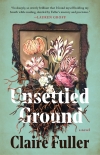Unsettled Ground Claire Fuller (grave mercy TXT) 📖

- Author: Claire Fuller
Book online «Unsettled Ground Claire Fuller (grave mercy TXT) 📖». Author Claire Fuller
She slowed when she saw the tractor tipped on its side, the engine still running but the plough somehow unhitched and underneath. It was Julius who was screaming, thrown so hard into the hedge that the hawthorns had him pinned there.
“Where’s Dad?” she shouted.
Her brother struggled and twisted, the thorns catching his skin and clothes. “Don’t look, don’t look!”
Jeanie saw her father’s hand, his arm trapped beneath a wheel. She recognized the long, piano player’s fingers, the pared nails. “Dad?” she called. In the hedge Julius struggled more and shouted at her to keep away, to go and fetch someone. But Jeanie crouched and saw the top of her father’s arm, saw the white of his shirt streaked with the mud of the field, and a crimson flower blooming. She called for him again. She couldn’t make sense of the mess of tractor, man, and plough until she noticed the buttons up the front of his shirt, his shoulders and his neck, but this ending, bloody, as though he had pushed his head deep into the ground. And then she saw and understood. She put her hands to her eyes and finally Julius was quiet and still.
For Julius that moment was all sound and light: the tractor or Jeanie screaming, the sun so bright it hurt his eyes, burned his face, seared the image in his mind. The image is in a box he rarely opens. The memory that has stayed with him most is from a time after the accident. It might have been days later, except that the wheat was halfway grown and the hawthorn was again full of petals, and by then there must have been police, an ambulance, a health and safety investigation of the farm, a delayed funeral, an inquest: accidental death. This day too was hot, and Dot took him and his sister to Priest’s Field, to the spot where their father died. At school he had earned some awed respect for using the word decapitated without flinching. He said it so often it lost its meaning.
That afternoon he was bored. His mother and sister—recently diagnosed with a heart condition—sat on a blanket with a flask of tea and slices of cake in a tin. Jeanie picked a bunch of red campion to lay on the spot where Frank died but Julius thought this was a stupid idea: the grass they were sitting on was full of the stuff. He wouldn’t sit with them, instead he tramped up and down between the lines of wheat, the sun burning the back of his neck. Every now and then he picked up a broken flint, testing the sharpness of its edge against his thumb. His mother called that they were leaving, and then he saw an object glint in the dry soil. When he bent over it, he realized it was, or had been, a large bolt, its nut gone and the metal shining where it had been bent out of shape by some terrific force. He imagined it might be a meteorite or, better, part of an alien spaceship which crash-landed and the authorities hushed up. If he dug down far enough, he might find the spaceship itself buried in the earth and he could bring his friends from school to the field and charge them fifty pence each to take a look.
“What have you got there?” his mother asked, and he went to hold out his hand to her and Jeanie, proud of his find. His sister exclaimed over it, as excited as he was, but their mother said, “Dirty rubbish,” and snatched the bolt from him.
Sometime after that, at about the anniversary of Frank’s death, Dot told him and Jeanie that the tractor and the plough were delivered without hitch pins—the pieces of metal that couple the tractor safely to the plough—or else they were lost, and new ones had been made from nuts and bolts. She told the story in such a roundabout way, while refusing to answer questions, that the twins were never clear about the details. But three times Rawson came to the cottage late at night after Jeanie and Julius were supposed to be asleep. On the first night when Julius heard Rawson’s voice, he crept downstairs and tried to listen to the conversation through the parlour door. On the second and third nights, Jeanie also listened, sitting on the left-hand stairs. In the morning on their way to school they discussed the snippets of talk they’d overheard, finishing each other’s sentences, piecing the events together: the year before, Rawson, excited to get his new tractor and plough but frustrated about the missing pieces, had fashioned them out of bolts; something homemade and so unsafe, the nuts had been sheared off with the consequences that neither Jeanie nor Julius could now unsee. They talked until they decided that Rawson must know he was guilty—of manslaughter, of murder—and out of shame and remorse, or terror that Dot would finally tell the police





Comments (0)